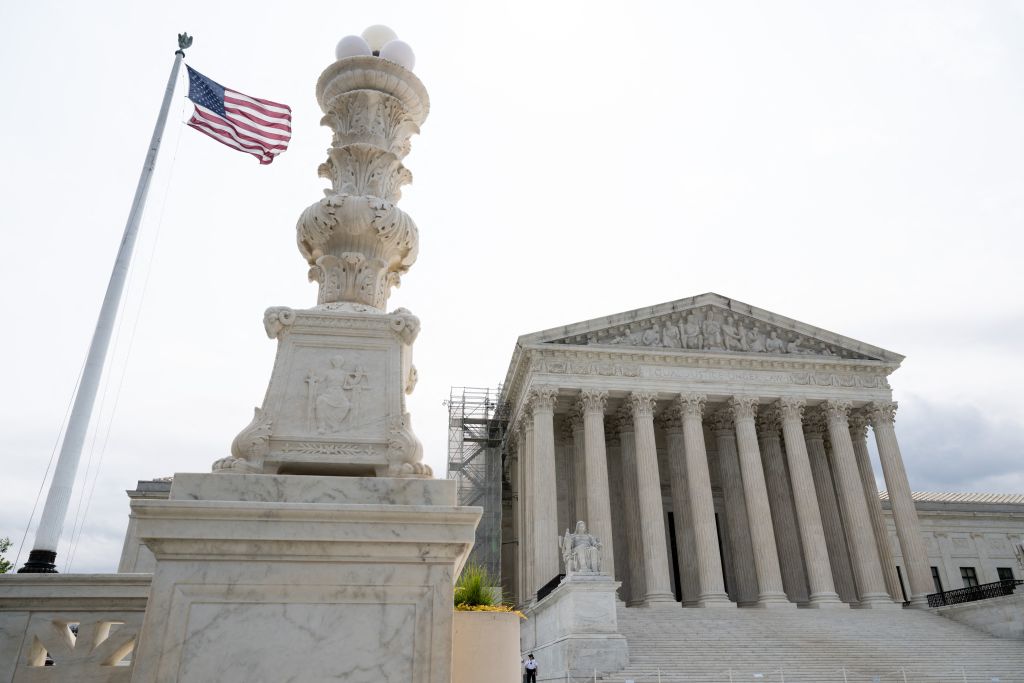The U.S. Supreme Court agreed Wednesday to review a case regarding a Jan. 6, 2021, defendant who says he was wrongly charged with a felony under a federal obstruction statute that has nothing to do with his conduct during the protest of the 2020 election results.
The outcome of the case could have implications for former President Donald Trump’s election interference case brought by special counsel Jack Smith, who has charged the 45th president under the same 18 U.S.C. 1512(c)(2), which has to do with the destruction of documents.
It would also have implications for the hundreds of Jan. 6 defendants charged with the same crime, including Edward Lang and Garret Miller, who bought similar appeals.
WARNING: The following social media post contains language that some may find offensive.
HOLY SH*T: Supreme Court will review 1512(c)(2), obstruction of an official proceeding case.
This is felony used against 300+ J6ers and represents half of Jack Smith’s indictment against Trump.
If SCOTUS determines DOJ has misused the statute…will be a game changer.
My…
— Julie Kelly ?? (@julie_kelly2) December 13, 2023
NBC News explained, “The provision was enacted in 2002 as part of the Sarbanes-Oxley Act, a bill passed in the aftermath of the Enron accounting scandal. As such, defendants say it was never intended to apply to an incident such as Jan. 6.”
The Department of Justice charged Joseph Fischer of Pennsylvania with “Obstruction of an Official Proceeding and Aiding and Abetting” under § 1512(c)(2).
The reason the DOJ is trying to shoehorn Fischer, Trump and others into this statute is that it is a felony, with potential jail time of up to 20 years.
U.S. District Judge Carl Nichols dismissed the obstruction charges against Fischer in March 2022, but in April of this year, the U.S. Court of Appeals for the District of Columbia Circuit sided with the DOJ, in a 2-1 vote reinstating them, according to NBC.
Nichols concluded that the §1512(c)(2) statute has to do with the destruction of documents or records in order to impede an official proceeding. The DOJ did not accuse Fischer of taking such an action in relation to the 2020 Electoral College certification vote that was taking place at the time of the Capitol incursion on Jan. 6, 2021, therefore the statute did not apply.
However, the D.C. Circuit Court found the statute’s language of “otherwise obstructs, influences, or impedes any official proceeding, or attempts to do so” could be separated from the context of document destruction and applied to the Jan. 6 defendants.
An amicus brief filed by America’s Future and U.S. Constitutional Rights Legal Defense Fund, among other groups in support of Fischer’s appeal to the Supreme Court, argued the reason the DOJ turned to §1512 instead of the felony of insurrection is that it could not prove the latter in court.
It will now be up to the Supreme Court to decide if §1512 applies to the Jan. 6 defendants.
Journalist Julie Kelly, who has covered Jan. 6 cases closely, noted the implications for Smith’s case against Trump.
“This is a day so many J6ers have been waiting for. Lives destroyed, people rotting in prison. All [because] Biden’s DOJ abused a post-Enron evidence tampering statute,” she posted on social media platform X on Wednesday.
“And what will Jack Smith do now? 2 of 4 counts in his indictment in jeopardy. This is potentially more impactful than immunity issue. Will he drop the 1512c2-related counts? Will he seek a superseding indictment with other charges? Trump’s lawyers presumably will file a motion to dismiss those counts. Never a boring day!”
This is a day so many J6ers have been waiting for.
Lives destroyed, people rotting in prison. All bc Biden’s DOJ abused a post-Enron evidence tampering statute.
And what will Jack Smith do now? 2 of 4 counts in his indictment in jeopardy. This is potentially more impactful than…
— Julie Kelly ?? (@julie_kelly2) December 13, 2023
Counts two and three of Smith’s indictment of Trump in the election interference case have to do with §1512 obstruction charges.
Clearly, Smith wants a trial and conviction of Trump before the 2024 election.
However, NBC News noted that the Supreme Court’s involvement could delay the trial start date, which is slated for March.
SCOTUS rulings generally take months, and a decision could come as late as the end of June, when the session ends.
Perhaps this explains why Smith filed a petition with the high court last week, seeking an expedited ruling as to whether presidential immunity applies to Trump’s actions taken while in office related to Jan. 6.
So at least a good portion of Smith’s election interference case appears largely up in the air at this point.
This article appeared originally on The Western Journal.

























 Continue with Google
Continue with Google